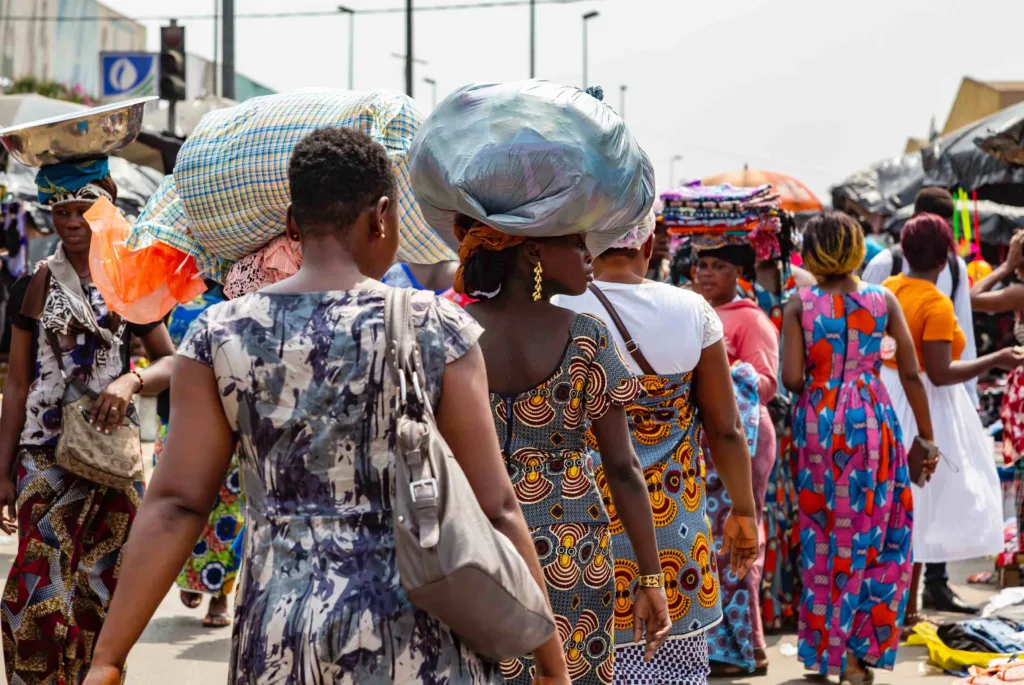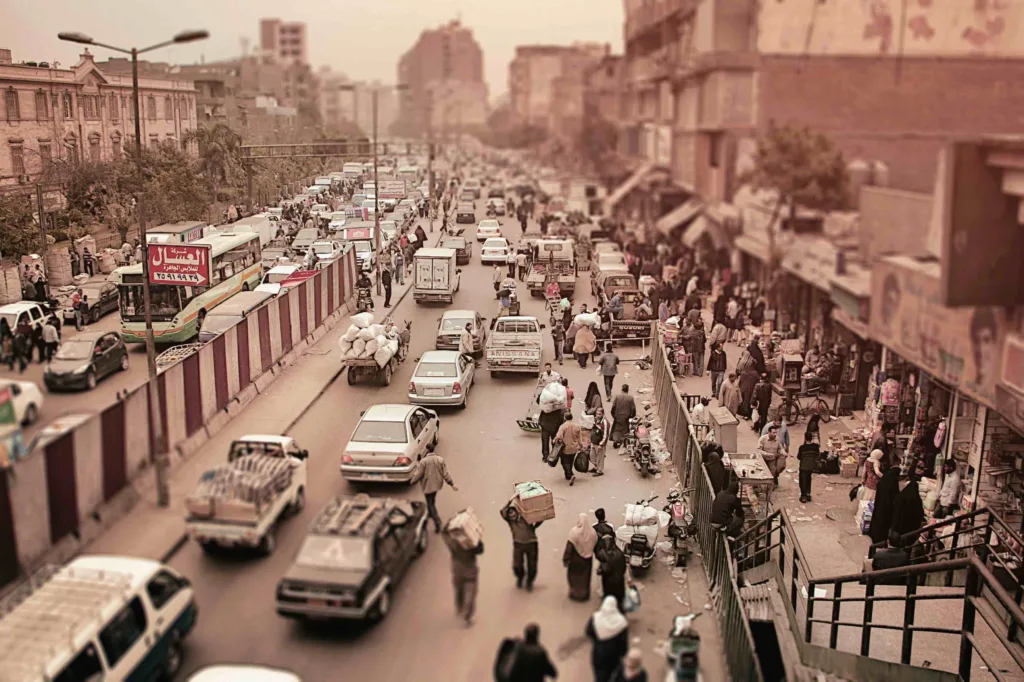Unlocking Africa’s Economic Potential: Overcoming Demographic, Energy, and Historical Challenges

Exploring the Impact of Population Growth on Africa’s Economic Development
Africa, a continent that is home to over 1.2 billion people, is projected to more than double its population by 2050. This population growth, while having the potential to be a driving force for economic development, also poses significant challenges for the continent. In this article, I will explore the positive and negative implications of Africa’s rapidly growing population for economic development and the steps that need to be taken to harness the demographic dividend.
On the positive side, a growing population in Africa serves as a source of labor and consumer demand, both of which are key drivers of economic growth. According to the World Bank, a growing population can lead to increased productivity as more people are available to work and contribute to the economy. Additionally, a growing population also leads to an increase in consumer demand for goods and services, which can stimulate production and consumption.
However, the rapid population growth in Africa also has negative implications for economic development. A large population puts strain on resources and infrastructure, making it harder for countries to provide basic necessities such as housing, food, and healthcare. This can lead to increased competition for resources and conflicts over land and water, which can negatively impact the economy (United Nations, 2019). Additionally, a large and rapidly growing population also puts pressure on infrastructure such as roads, hospitals, and schools, which can be particularly challenging for countries with weak economic infrastructure (United Nations, 2019).
Furthermore, Africa’s population growth has led to a demographic challenge, with a large proportion of the population under the age of 25. This presents a number of economic challenges, including high unemployment, increased competition for jobs, and a lack of skills and education (United Nations, 2019). These issues can be particularly challenging for countries with weak economic infrastructure, leading to a poverty trap.
Moreover, if not addressed properly, the population growth in Africa could cause significant strain on the environment. The increasing demand for food, water, and energy could lead to depletion of resources or damage to ecosystems, in addition to increased pollution and other negative environmental impacts (United Nations, 2019).
On the other hand, Africa has the potential to harness the demographic dividend, which is the economic growth that can occur when a country has a large number of people in the working-age population and a relatively smaller number of people who are either too young or too old to work (World Bank, 2020). Harnessing the demographic dividend can lead to increased economic productivity and contribute to sustainable economic development in Africa.
To harness the demographic dividend and address the challenges posed by population growth, Africa needs to invest in its people through education and skills training. This will enable young people to participate in the workforce and contribute to economic growth (United Nations, 2019). Additionally, Africa needs to address issues related to infrastructure and resource availability to create an enabling environment for economic development. This includes investing in transportation, housing, and healthcare infrastructure, as well as ensuring that resources such as land and water are accessible and used sustainably (World Bank, 2020).
In conclusion, Africa’s rapidly growing population has both positive and negative implications for economic development. While it provides a source of labor and consumer demand, it also puts a strain on resources and infrastructure and leads to increased competition for resources. To harness the demographic dividend and achieve sustainable economic development, Africa needs to invest in its people and address issues related to infrastructure and resource availability.
The Role of Demographics in Shaping Africa’s Economic Development and Food Supply Chain
Africa is a continent with a rapidly growing population, and demographic factors play a crucial role in shaping the continent’s economic development. The continent’s young population, for example, has a significant impact on the speed of industrialization and the success of different industries. Additionally, Africa’s large agricultural sector holds a great deal of potential for modernization and mechanization, which could potentially boost the food supply chain.
One of the key ways in which demographic factors influence economic development in Africa is by affecting the speed of industrialization. Countries with young populations are more likely to experience rapid industrialization, as a large proportion of the population is of working age. According to a report by the United Nations, “countries with a large youth population can take advantage of a demographic window of opportunity by investing in education and training, health and nutrition, and job creation, so as to increase their human capital and productivity, and to reap a demographic dividend” (United Nations, 2019). In other words, countries with young populations have a large pool of potential workers, who can be trained and employed in new industries, leading to increased productivity and economic growth.
Moreover, demographic factors also influence which industries are most successful in different regions of Africa. For example, countries with a high proportion of young people are more likely to see growth in industries that are labor-intensive, such as manufacturing and construction (United Nations, 2019). In contrast, countries with an aging population are more likely to see growth in industries that are less labor-intensive, such as service-based industries (United Nations, 2019).
Africa’s large agricultural sector is another area where demographic factors play a role. The sector has a lot of potential for modernization and mechanization, which could potentially boost the food supply chain. With a large population and a high dependency on the sector, the agricultural sector has the potential to create jobs, improve food security, and stimulate economic growth. However, to harness this potential, it is essential to invest in the sector, particularly in technology, infrastructure, and education, to improve productivity and efficiency (World Bank, 2020). Additionally, Africa’s large youth population could be targeted to be trained and employed in the sector, thus increasing the sector’s human capital.
However, despite the potential of Africa’s demographic dividend, the continent also faces significant challenges that need to be addressed. These include high unemployment, particularly among the youth, and a lack of skills and education (United Nations, 2019). Additionally, Africa needs to address issues related to infrastructure and resource availability, such as access to transportation, housing, and healthcare, to create an enabling environment for economic development (World Bank, 2020).
In conclusion, demographic factors play a significant role in shaping Africa’s economic development. The continent’s young population can drive rapid industrialization and growth in labor-intensive industries, while Africa’s large agricultural sector holds great potential for modernization and mechanization that could boost the food supply chain. To fully harness the potential of Africa’s demographic dividend, the continent needs to invest in education and training, health and nutrition, and job creation, while addressing issues related to infrastructure and resource availability.

Overcoming Energy Insecurity for Sustainable Economic Development in Africa
Energy is a fundamental driver of economic growth and development, and Africa is no exception. Access to reliable and affordable energy is essential for most industries, including manufacturing, agriculture, transportation, and service sectors. However, in Africa, many countries still face issues with energy insecurity, which has a significant impact on economic development.
One of the most significant challenges facing Africa’s energy sector is the lack of access to electricity. According to the International Energy Agency, nearly 600 million people in Africa lack access to electricity, and the majority of these people live in rural areas (IEA, 2020). This lack of access to electricity poses a significant barrier to economic development, as it limits the ability of businesses and households to power their operations and access modern amenities.
Furthermore, Africa also faces significant challenges in terms of energy affordability. The cost of electricity in many African countries is among the highest in the world, making it difficult for businesses and households to afford the energy they need (World Bank, 2019). This high cost of energy can also discourage investment in industries that are energy-intensive, such as manufacturing, further constraining economic development.
In addition to these challenges, Africa also faces issues with energy insecurity, which refers to the reliability and continuity of energy supply. Energy insecurity can have a significant impact on economic development, as it makes it difficult for businesses and households to plan and invest for the future. Power outages and shortages can disrupt production and lead to lost income, which can further constrain economic growth (World Bank, 2019).
Despite these challenges, there are also significant opportunities for Africa to address its energy insecurity and promote economic development. One promising avenue for addressing energy insecurity is through the development of renewable energy sources, such as solar and wind power. These sources of energy are abundant in Africa and can be developed at a lower cost than traditional fossil fuels, making them more accessible to a wider range of people and businesses (IEA, 2020).
In addition, energy efficiency measures can also play a significant role in addressing energy insecurity and promoting economic development. Energy efficiency measures, such as energy-efficient lighting and appliances, can reduce the amount of energy needed to power homes and businesses, thus reducing costs and increasing access to energy.
Finally, in order to tackle the energy insecurity, the governments and private sectors should work together to create an enabling environment for private sector investments in the energy sector. This should include policy frameworks and regulations that promote private sector investment, as well as funding mechanisms to support the development of energy infrastructure.
In conclusion, energy supply and accessibility is a key factor in Africa’s economic development. Many countries in Africa still face issues with energy insecurity, which is a major constraint to development. However, through the development of renewable energy sources and energy efficiency measures, and fostering a conducive environment for private sector investments in the energy sector, Africa can address its energy insecurity and promote economic development.

The Lasting Impact of Colonialism on Africa’s Economic Development and Future Outlook
Africa’s history has played a significant role in shaping the continent’s economic development. Many African countries were colonized by European powers in the past, and the legacy of this colonization continues to shape the continent’s politics and economics today.
During the colonial period, European powers imposed their economic and political systems on Africa, often with little regard for the needs and interests of the indigenous populations. This legacy can still be seen in the continent’s political and economic institutions, which were often designed to serve the interests of the colonizers rather than the indigenous populations.
One of the most significant ways in which colonialism has affected Africa’s economic development is through the forced extraction of resources. During the colonial period, European powers exploited Africa’s resources, such as minerals and agricultural products, for their own economic gain. This extractive economic model has left many African countries heavily dependent on the export of raw materials, rather than developing a diversified economy.
Moreover, the colonial period has also left a lasting impact on Africa’s infrastructure, as the colonizers built infrastructure to serve their own interests, rather than to meet the needs of the indigenous population. This has led to a lack of infrastructure in many areas, including transportation, telecommunications, and electricity, which continue to constrain economic development today.
In addition, the borders imposed during the colonial period have also had a lasting impact on Africa’s economic development. Many of the borders were drawn with little regard for ethnic and cultural realities, leading to the separation of ethnic groups and the disruption of trade and economic activity. Today, these arbitrary borders continue to create barriers to trade and economic integration, which has a negative impact on economic growth.
Furthermore, the colonial period also led to the displacement of indigenous populations and the displacement of people from their ancestral lands, leading to loss of access to resources and food insecurity, which continues to affect the economies of many African countries.
However, Africa has been taking steps to address these issues and to reshape its future. Many African countries have been working to develop more diversified economies and to promote economic growth. This includes the development of industries such as tourism, information technology, and manufacturing, and a focus on creating an enabling environment for private sector development. In addition, African countries are also working to improve infrastructure and to promote regional trade and economic integration.
In conclusion, Africa’s history, particularly the legacy of colonialism, has had a significant impact on the continent’s economic development. The forced extraction of resources, the lack of appropriate infrastructure, the arbitrary borders and the displacement of indigenous populations have all contributed to the continent’s current economic challenges. However, Africa is taking steps to address these issues and to reshape its future through diversifying its economy, improving infrastructure and promoting regional trade and economic integration. It’s important to acknowledge the past in order to move forward and create a more equitable and sustainable economic future for the continent and its people.
The future outlook for Africa is complex and multifaceted, influenced by a range of factors including population growth, energy accessibility, infrastructure, and the legacy of colonialism.
In terms of population growth, Africa’s rapidly growing population has the potential to be a driving force for economic development, providing a large pool of labor and increasing consumer demand. However, it can also put a strain on resources and infrastructure, and lead to increased competition for resources. To harness the demographic dividend and achieve sustainable economic development, Africa needs to invest in its people and address issues related to infrastructure and resource availability.
Access to reliable and affordable energy is also an essential factor for the continent’s economic development. Many African countries still face issues with energy insecurity, which has a significant impact on economic development. But Africa also has a lot of potential in developing renewable energy sources and energy efficiency measures, which could increase access to energy and reduce costs.
Infrastructure is another key area that needs attention for Africa to move forward. The lack of appropriate infrastructure in many areas such as transportation, telecommunications, and electricity, has constrained the economic development of the continent. However, governments and private sectors should work together to create an enabling environment for private sector investments in the infrastructure sector.
The legacy of colonialism also continues to shape the continent’s politics and economics. Extractive economic model, arbitrary borders, displacement of indigenous populations, and lack of appropriate infrastructure all have resulted from the colonial period. However, Africa is taking steps to address these issues and to reshape its future through diversifying its economy, improving infrastructure and promoting regional trade and economic integration.
In conclusion, while the future outlook for Africa is challenging, there are also significant opportunities for growth and development. By addressing population growth, energy insecurity, infrastructure, and the legacy of colonialism, the continent can harness its demographic dividend and create a more equitable and sustainable economic future. However, It is important to note that there are also external factors that could influence the future of Africa such as climate change, political stability, and global economic shifts. The successful addressing of these factors can enable Africa to reach its potential and contribute to the global economy.

Challenging Conventional Approaches: Alternative Economic Development Strategies for Africa
An alternative approach to economic development in Africa could be to focus on building local and indigenous economic systems, rather than trying to replicate Western models. This approach would prioritize the use of local resources and the empowerment of local communities, rather than relying on outside investment and external influences.
One aspect of this approach could be the promotion of community-based economic activities such as cooperatives, which are owned and controlled by the members who use its services and can provide a way for people to work together to improve their economic situation. This can be particularly beneficial in rural areas, where small-scale farming and other agricultural activities can provide a sustainable source of livelihood.
Another alternative approach would be to focus on building a strong cultural economy by utilizing and promoting Africa’s rich cultural heritage and traditional knowledge. This can include promoting traditional arts, crafts and other cultural industries, which can generate income and employment opportunities, while preserving cultural identity.
A culture-based approach could also include the integration of traditional ecological knowledge and sustainable practices into economic development. This would prioritize the conservation of natural resources and the promotion of sustainable farming and other agricultural practices, which can ensure food security, improve living standards and contribute to a more resilient economy.
Additionally, a more decentralized and community-led approach to economic development in Africa could also help to address issues related to infrastructure and resource availability. By involving local communities in the planning and implementation of development projects, it can ensure that the projects align with the needs and priorities of the communities
and also foster a sense of ownership and accountability. This can lead to more sustainable and effective development outcomes.
Another alternative approach would be to focus on the promotion of small and medium-sized enterprises (SMEs) as a key driver of economic growth. SMEs can be particularly effective in promoting job creation and economic diversification in Africa. This can be supported by policies and initiatives aimed at providing access to finance, business development services, and other forms of support to help SMEs to start and grow.
A more decentralized approach to economic development also allows for more experimentation and innovation, and the adaptation of development models to the specific context and characteristics of each region. This could promote a more flexible and adaptive approach to economic development, and better respond to the unique needs and challenges of different regions and communities.
In conclusion, the ideas above can be challenged by alternative economic development ideas and culture-based approaches. By focusing on building local and indigenous economic systems, utilizing and promoting Africa’s rich cultural heritage, traditional knowledge and community-based economic activities, promoting SMEs and a more decentralized approach to development, Africa can create a more equitable and sustainable economic future.
References
United Nations. (2019). World Population Prospects 2019: Highlights.
World Bank. (2020). Harnessing the Demographic Dividend.
International Energy Agency (IEA) (2020) Africa Energy Outlook
World Bank (2019) Energy in Africa.


Comments are closed.